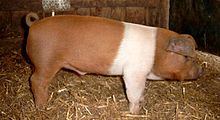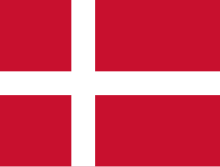Danish Protest Pig
 Danish Protest pig | |
| Conservation status | Rare breed |
|---|---|
| Other names | Red Pied Husum (Ger. Rotbuntes Husumer), German Red Pied (Ger. Rotbuntes Schwein, Rotbunte Schleswig-Holsteiner)[1] |
| Nicknames | Protest pig[1] |
| Country of origin | Denmark |
| Traits | |
| Weight |
|
| Notes | |
| Crossed Holsteinian and Jutlandian marsh pigs, Tamworth pig and Angeln Saddleback | |
| |
The Husum Red Pied[2] (German: Rotbuntes Husumer[3]) is a rare breed of domestic pig with the nickname Danish Protest pig[4] (German: Husumer Protestschwein and Danish: Husum protestsvin or danske protestsvin). It originates from North Frisia in Southern Schleswig in the beginning of the 20th century, when Danes living in the area under Prussian rule were prohibited from raising the Danish flag and displayed the Protest Pig instead. Due to its red color, its broad white vertical belt, and a trace of a white horizontal belt resembling the colors of the flag of Denmark, it was made a symbol of their cultural identity.

The breed grows to a height of about 92 cm (36 in) and weighs up to 350 kg. It was probably created out of Holsteinian and Jutlandian marsh pigs, the English Tamworth pig, and red variants of the Angeln Saddleback. It was recognized as a breed in 1954, but after a last birth in 1968, the breed was considered extinct.
Only in 1984 were pigs fully corresponding to the descriptions of the breed seen again. Associations of breeders continue to breed it and to register existing pigs of this breed. Breeding populations exist in the Berlin Zoological Garden, the Hanover Zoo, the near Kiel, in the ZOOM Erlebniswelt Gelsenkirchen, in Dalmsdorf (Mecklenburg), Hof Lütjensee, and on the Archehof Blumencron. The Dortmund Zoo and the Tierpark Krüzen house small populations too. At the moment, around 140 specimens are alive worldwide. The German federal state of Schleswig-Holstein supports preservation of the breed for its cultural value.
References[]
- ^ a b Mason, Ian Lauder: A world dictionary of livestock breeds, types and varieties. 4th edition. CAD International, Wallingford 1996, ISBN 0-85199-102-5, p. 164.
- ^ Valerie Porter: Mason's World Dictionary of Livestock Breeds, Types and Varieties
- ^ FAO DAD-IS: Rotbunte Husumer
- ^ Graham R. Duncanson: Veterinary Treatment of Pigs, p. 3.
External links[]
- Pig breeds
- Pig breeds originating in Germany
- Animal breeds on the GEH Red List